Related Research Articles

Merseburg is a town in central Germany in southern Saxony-Anhalt, situated on the river Saale, and approximately 14 km south of Halle (Saale) and 30 km west of Leipzig. It is the capital of the Saalekreis district. It had a diocese founded by Archbishop Adalbert of Magdeburg. The University of Merseburg is located within the town. Merseburg has around 35,000 inhabitants.

Saxony-Anhalt is a state of Germany, bordering the states of Brandenburg, Saxony, Thuringia and Lower Saxony. It covers an area of 20,451.7 square kilometres (7,896.4 sq mi) and has a population of 2.17 million inhabitants, making it the 8th-largest state in Germany by area and the 11th-largest by population. Its capital is Magdeburg and its largest city is Halle (Saale).

The National-Democratic Party of Germany was an East German political party that served as a satellite party to the Socialist Unity Party of Germany (SED) from 1948 to 1989, representing former members of the Nazi Party, the Wehrmacht and middle classes. It should not be confused with the far-right National Democratic Party of Germany, which was a party in West Germany and continues as a minor non-governmental party in the modern united Germany.

The Christian Democratic Union of Germany was an East German political party founded in 1945. It was part of the National Front with the Socialist Unity Party of Germany (SED) and a bloc party until 1989.
The German Democratic Republic was created as a socialist republic on 7 October 1949 and began to institute a government based on the government of the Soviet Union during the Stalin era. The equivalent of the Communist Party in East Germany was the Sozialistische Einheitspartei Deutschlands, which along with other parties, was part of the National Front of Democratic Germany. It was created in 1946 through the merger of the Communist Party of Germany (KPD) and the Social Democratic Party of Germany (SPD) in the Soviet Occupation Zone of Germany. Following German reunification, the SED was renamed the Party of Democratic Socialism (PDS), which eventually merged with the West German Electoral Alternative for Labor and Social Justice to form the modern Left Party.

Harald Ringstorff was a German politician of the Social Democratic Party (SPD) and the 3rd Minister President of the state of Mecklenburg-Vorpommern. He headed a coalition government of the SPD and PDS from 1998 until 2006, and subsequently headed a coalition between the SPD and CDU. He was the 61st President of the Bundesrat in 2006/07.

General elections were held in East Germany on 18 March 1990, and were the first and only free elections held in the state before German reunification. The Alliance for Germany, led by the new East German branch of the right-wing Christian Democratic Union (CDU), won 192 seats and emerged as the largest bloc in the 400-seat Volkskammer, having run on a platform of speedy reunification with West Germany. The East German branch of the Social Democratic Party (SPD), which had been dissolved in 1946 and refounded only six months before the elections, finished second with 88 seats despite being widely expected to win. The former Socialist Unity Party of Germany, restyled as the Party of Democratic Socialism (PDS), finished third with 66 seats the first free election in which it participated.
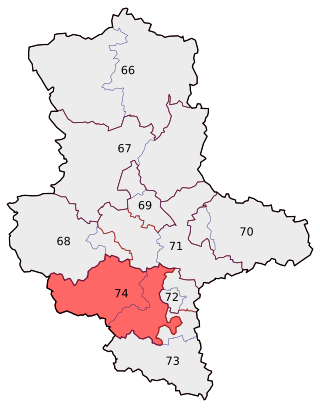
Mansfeld is an electoral constituency represented in the Bundestag. It elects one member via first-past-the-post voting. Under the current constituency numbering system, it is designated as constituency 74. It is located in southern Saxony-Anhalt, comprising the Mansfeld-Südharz district and most of the Saalekreis district.
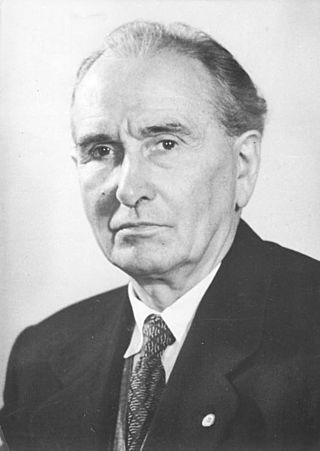
Bernard Johann Heinrich Koenen was a German politician.

Günther Wyschofsky is a former politician and official in the German Democratic Republic. He became a member of the powerful Central Committee of the country's ruling Socialist Unity Party in 1964. For more than two decades he also served as junior Minister for the Chemicals Industry.
Rolf Landsberg was a German Professor of Physical Chemistry.
Christa Schmidt is a retired German politician (CDU). She served as a minister in the last government of East Germany. She had built an earlier career as a teacher and educationalist.
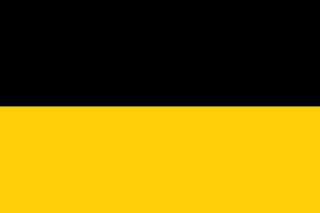
The State of Saxony-Anhalt was a subdivision of the Soviet occupation zone and state of East Germany which broadly corresponds with the present-day German state Saxony-Anhalt. After the retreat of the US troops from the Western parts - following the agreements of the Yalta Conference - it was formed as administrative division called Province of Saxony by the Soviet Military Administration in Germany (SMAD) in July 1945. The province was a re-establishment of the Province of Saxony which existed in Prussia from 1816 to 1944. On 1 July 1944, the Province of Saxony was divided along the lines of its three government districts of Halle-Merseburg, Magdeburg and Erfurt. The two provinces became part of the new state including small parts of Thuringia (Allstedt) and Soviet-occupied parts of Anhalt (Dessau) and Brunswick. Following the first election for the Landtag in October 1946, the state was renamed to Province of Saxony-Anhalt on the same day. With the abolition of Prussia in February 1947, it was named State of Saxony-Anhalt. Compared to the administrative divisions of Nazi Germany, it comprised the Gaue Magdeburg-Anhalt, Halle-Merseburg and small parts of Southern Hanover-Brunswick and Thuringia.
Bertram Wieczorek is a German physician and former politician (CDU).

Dietmar Keller was an East German politician (SED/PDS) who served as Minister for Culture in the Modrow government. After reunification he sat as a member of the German parliament ("Bundestag") between 1990 and 1994.
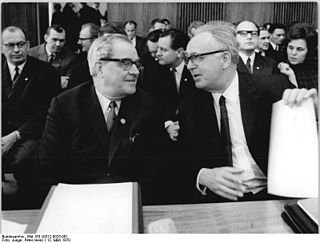
Hermann Klare was a chemistry academic who played a prominent role in scientific administration and research in the German Democratic Republic (GDR). Klare held professorships at the Technical University Leuna-Merseburg and at Humboldt University (Berlin). From 1968 to 1979 he was president of the German Academy of Sciences.

Werner Jarowinsky was an East German economist who became a party official. Between 1963 and 1989 he was a member of the powerful Party Central Committee which, under the Leninist constitutional structure that the country had adopted after 1949, was the focus of political power and decision making. Within the Central Committee, from 1984 till 1989, he served as a member of Politburo which controlled and coordinated the work of the Central Committee on behalf of the leadership.
Gerd Schuchardt is an electrical engineer who built his career and reputation in East Germany before 1990 in microprocessor technology and related forward-looking branches of science. He was interested in politics, but had avoided involvement in the country's ruling SED (party) or any of the various the various so-called "bloc parties" which it controlled. In January 1990, with the winds of political change - somewhat implausibly, as many still thought at the time - blowing across from the Kremlin in Moscow, the party leaders in East Berlin no longer felt able to stand against domestic pressures for a return to democratic politics after more than half a century of one-party dictatorship. Gerd Schuchardt became an activist member of the re-awakening Social Democratic Party. After reunification in October 1990 state-level democratic politics returned to Thuringia: Schuchardt became a leading figure in Thuringian state politics, selected by party members as the Social Democratic Party's lead candidate in the 1994 Thuringian state election. He led his party to what turned out to be its best electoral result in Thuringia to date. In the resulting "Grand coalition" government that ensued he served as vice-minister-president until 1999 under the leadership of Bernhard Vogel (CDU) and as Minister for the Sciences, Research and the Arts.

Wolfgang Rauls is a German politician of the Free Democratic Party (FDP). He was the last leader of the National Democratic Party during the Wende, before its eventual merger into the Free Democratic Party. After German reunification, he entered state politics in Saxony-Anhalt, serving as Minister for the Environment and, eventually, Deputy Minister-President in the CDU cabinets from 1990 to 1994.
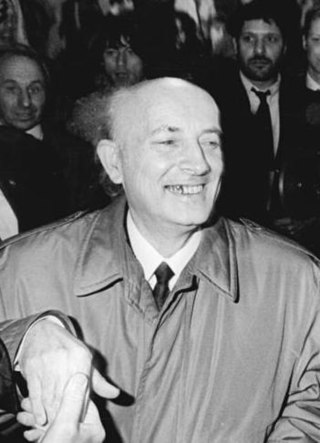
Hans-Wilhelm Ebeling was a German Lutheran clergyman and politician.
References
- ↑ Gläser, Roger (October 27, 2021). "Trauer um Prof. Dr. Karl-Hermann Steinberg". Universität Leipzig.
- 1 2 Bob Schwartz (22 March 1990). "E. German Spends Historic Day at UCI". Orange County focus. Los Angeles Times . Retrieved 22 February 2015.
- 1 2 3 4 5 6 7 Helmut Müller-Enbergs. "Steinberg, Karl-Hermann * 22.6.1941 Stellv. Vorsitzender der CDU, Minister für Umwelt- u. Naturschutz, Energie u. Reaktorsicherheit" (in German). Bundesstiftung zur Aufarbeitung der SED-Diktatur: Biographische Datenbanken. Retrieved 22 February 2015.
- 1 2 Petra Schink (30 May 1986). "Es ist ein gutes Gefühl, Nützliches vollbracht zu haben: Prof. Dr. Steinberg (CDU), Sektion Chemie, kandidiert für die Volkskammer" (PDF). UZ - Universitätszeitung: Organ der Kreisleitung der SED. Universitätsarchiv Leipzig. p. 4. Retrieved 22 February 2015.
- ↑ Klaus-Peter Voigt (15 August 2008). "Mikroalgen aus der Altmark mindern CO2-Aufkommen". Mitteldeutsche Zeitung, Halle . Retrieved 22 February 2015.